- Home
- Henry James
The Wings of the Dove Page 15
The Wings of the Dove Read online
Page 15
Many things, though not in many weeks, had come and gone since then, and one of the best of them doubtless had been the voyage itself, by the happy southern course, to the succession of Mediterranean ports, with the dazzled wind-up at Naples. Two or three others had preceded this; incidents, indeed rather lively marks, of their last fortnight at home, and one of which had determined on Mrs. Stringham’s part a rush to New York, forty-eight breathless hours there, previous to her final rally. But the great sustained sea-light had drunk up the rest of the picture, so that for many days other questions and other possibilities sounded with as little effect as a trio of penny whistles might sound in a Wagner overture. It was the Wagner overture that practically prevailed, up through Italy, where Milly had already been, still further up and across the Alps, which were also partly known to Mrs. Stringham; only perhaps “taken” to a time not wholly congruous, hurried in fact on account of the girl’s high restlessness. She had been expected, she had frankly promised, to be restless—that was partly why she was “great”—or was a consequence, at any rate, if not a cause; yet she had not perhaps altogether announced herself as straining so hard at the cord. It was familiar, it was beautiful to Mrs. Stringham that she had arrears to make up, the chances that had lapsed for her through the wanton ways of forefathers fond of Paris, but not of its higher sides, and fond almost of nothing else; but the vagueness, the openness, the eagerness without point and the interest without pause—all a part of the charm of her oddity as at first presented—had become more striking in proportion as they triumphed over movement and change. She had arts and idiosyncrasies of which no great account could have been given, but which were a daily grace if you lived with them; such as the art of being almost tragically impatient and yet making it as light as air; of being inexplicably sad and yet making it as clear as noon; of being unmistakeably gay and yet making it as soft as dusk. Mrs. Stringham by this time understood everything, was more than ever confirmed in wonder and admiration, in her view that it was life enough simply to feel her companion’s feelings; but there were special keys she had not yet added to her bunch, impressions that of a sudden were apt to affect her as new.
This particular day on the great Swiss road had been, for some reason, full of them, and they referred themselves, provisionally, to some deeper depth than she had touched—though into two or three such depths, it must be added, she had peeped long enough to find herself suddenly draw back. It was not Milly’s unpacified state, in short, that now troubled her—though certainly, as Europe was the great American sedative, the failure was to some extent to be noted: it was the suspected presence of something behind the state—which, however, could scarcely have taken its place there since their departure. What a fresh motive of unrest could suddenly have sprung from was in short not to be divined. It was but half an explanation to say that excitement, for each of them, had naturally dropped, and that what they had left behind, or tried to—the great serious facts of life, as Mrs. Stringham liked to call them—was once more coming into sight as objects loom through smoke when smoke begins to clear; for these were general appearances from which the girl’s own aspect, her really larger vagueness, seemed rather to disconnect itself. The nearest approach to a personal anxiety indulged in as yet by the elder lady was on her taking occasion to wonder if what she had more than anything else got hold of mightn’t be one of the finer, one of the finest, one of the rarest—as she called it so that she might call it nothing worse—cases of American intensity. She had just had a moment of alarm—asked herself if her young friend were merely going to treat her to some complicated drama of nerves. At the end of a week, however, with their further progress, her young friend had effectively answered the question and given her the impression, indistinct indeed as yet, of something that had a reality compared with which the nervous explanation would have been coarse. Mrs. Stringham found herself from that hour, in other words, in presence of an explanation that remained a muffled and intangible form, but that assuredly, should it take on sharpness, would explain everything and more than everything, would become instantly the light in which Milly was to be read.
Such a matter as this may at all events speak of the style in which our young woman could affect those who were near her, may testify to the sort of interest she could inspire. She worked—and seemingly quite without design—upon the sympathy, the curiosity, the fancy of her associates, and we shall really ourselves scarce otherwise come closer to her than by feeling their impression and sharing, if need be, their confusion.8 She reduced them, Mrs. Stringham would have said, to a consenting bewilderment; which was precisely, for that good lady, on a last analysis, what was most in harmony with her greatness. She exceeded, escaped measure, was surprising only because they were so far from great. Thus it was that on this wondrous day by the Brünig the spell of watching her had grown more than ever irresistible; a proof of what—or of a part of what—Mrs. Stringham had, with all the rest, been reduced to. She had almost the sense of tracking her young friend as if at a given moment to pounce. She knew she shouldn’t pounce, she hadn’t come out to pounce; yet she felt her attention secretive, all the same, and her observation scientific. She struck herself as hovering like a spy, applying tests, laying traps, concealing signs. This would last, however, only till she should fairly know what was the matter; and to watch was after all, meanwhile, a way of clinging to the girl, not less than an occupation, a satisfaction in itself. The pleasure of watching moreover, if a reason were needed, came from a sense of her beauty. Her beauty hadn’t at all originally seemed a part of the situation, and Mrs. Stringham had even in the first flush of friendship not named it grossly to any one; having seen early that for stupid people—and who, she sometimes secretly asked herself, wasn’t stupid?—it would take a great deal of explaining. She had learned not to mention it till it was mentioned first—which occasionally happened, but not too often; and then she was there in force. Then she both warmed to the perception that met her own perception, and disputed it, suspiciously, as to special items; while, in general, she had learned to refine even to the point of herself employing the word that most people employed. She employed it to pretend she was also stupid and so have done with the matter; spoke of her friend as plain, as ugly even, in a case of especially dense insistence; but as, in appearance, so “awfully full of things.” This was her own way of describing a face that, thanks doubtless to rather too much forehead, too much nose and too much mouth, together with too little mere conventional colour and conventional line, was expressive, irregular, exquisite, both for speech and for silence. When Milly smiled it was a public event—when she didn’t it was a chapter of history. They had stopped on the Brünig for luncheon, and there had come up for them under the charm of the place the question of a longer stay.
Mrs. Stringham was now on the ground of thrilled recognitions, small sharp echoes of a past which she kept in a well-thumbed case, but which, on pressure of a spring and exposure to the air, still showed itself ticking as hard as an honest old watch. The embalmed “Europe” of her younger time had partly stood for three years of Switzerland, a term of continuous school at Vevey, with rewards of merit in the form of silver medals tied by blue ribbons and mild mountain-passes attacked with alpenstocks. It was the good girls who, in the holidays, were taken highest, and our friend could now judge, from what she supposed her familiarity with the minor peaks, that she had been one of the best. These reminiscences, sacred to-day because prepared in the hushed chambers of the past, had been part of the general train laid for the pair of sisters, daughters early fatherless, by their brave Vermont mother, who struck her at present as having apparently, almost like Columbus, worked out, all unassisted, a conception of the other side of the globe. She had focussed Vevey, by the light of nature and with extraordinary completeness, at Burlington; after which she had embarked, sailed, landed, explored and, above all, made good her presence. She had given her daughters the five years in Switzerland and Germany that were to leave them ever afterw
ards a standard of comparison for all cycles of Cathay,p and to stamp the younger in especial—Susan was the younger—with a character, that, as Mrs. Stringham had often had occasion, through life, to say to herself, made all the difference. It made all the difference for Mrs. Stringham, over and over again and in the most remote connexions, that, thanks to her parent’s lonely thrifty hardy faith, she was a woman of the world. There were plenty of women who were all sorts of things that she wasn’t, but who, on the other hand, were not that, and who didn’t know she was (which she liked—it relegated them still further) and didn’t know either how it enabled her to judge them. She had never seen herself so much in this light as during the actual phase of her associated, if slightly undirected, pilgrimage; and the consciousness gave perhaps to her plea for a pause more intensity than she knew. The irrecoverable days had come back to her from far off; they were part of the sense of the cool upper air and of everything else that hung like an indestructible scent to the torn garment of youth—the taste of honey and the luxury of milk, the sound of cattle-bells and the rush of streams, the fragrance of trodden balms and the dizziness of deep gorges.
Milly clearly felt these things too, but they affected her companion at moments—that was quite the way Mrs. Stringham would have expressed it—as the princess in a conventional tragedy might have affected the confidant if a personal emotion had ever been permitted to the latter. That a princess could only be a princess was a truth with which, essentially, a confidant, however responsive, had to live. Mrs. Stringham was a woman of the world, but Milly Theale was a princess, the only one she had yet had to deal with, and this, in its way too, made all the difference. It was a perfectly definite doom for the wearer—it was for every one else an office nobly filled. It might have represented possibly, with its involved loneliness and other mysteries, the weight under which she fancied her companion’s admirable head occasionally, and ever so submissively, bowed. Milly had quite assented at luncheon to their staying over, and had left her to look at rooms, settle questions, arrange about their keeping on their carriage and horses; cares that had now moreover fallen to Mrs. Stringham as a matter of course and that yet for some reason, on this occasion particularly, brought home to her—all agreeably, richly, almost grandly—what it was to live with the great. Her young friend had in a sublime degree a sense closed to the general question of difficulty, which she got rid of furthermore not in the least as one had seen many charming persons do, by merely passing it on to others. She kept it completely at a distance: it never entered the circle; the most plaintive confidant couldn’t have dragged it in; and to tread the path of a confidant was accordingly to live exempt. Service was in other words so easy to render that the whole thing was like court life without the hardships. It came back of course to the question of money, and our observant lady had by this time repeatedly reflected that if one were talking of the “difference,” it was just this, this incomparably and nothing else, that when all was said and done most made it. A less vulgarly, a less obviously purchasing or parading person she couldn’t have imagined; but it prevailed even as the truth of truths that the girl couldn’t get away from her wealth. She might leave her conscientious companion as freely alone with it as possible and never ask a question, scarce even tolerate a reference; but it was in the fine folds of the helplessly expensive little black frock that she drew over the grass as she now strolled vaguely off; it was in the curious and splendid coils of hair, “done” with no eye whatever to the mode du jour,q that peeped from under the corresponding indifference of her hat, the merely personal tradition that suggested a sort of noble inelegance; it lurked between the leaves of the uncut but antiquated Tauchnitzr volume of which, before going out, she had mechanically possessed herself. She couldn’t dress it away, nor walk it away, nor read it away, nor think it away; she could neither smile it away in any dreamy absence nor blow it away in any softened sigh. She couldn’t have lost it if she had tried—that was what it was to be really rich. It had to be the thing you were. When at the end of an hour she hadn’t returned to the house Mrs. Stringham, though the bright afternoon was yet young, took, with precautions, the same direction, went to join her in case of her caring for a walk. But the purpose of joining her was in truth less distinct than that of a due regard for a possibly preferred detachment: so that, once more, the good lady proceeded with a quietness that made her slightly “underhand” even in her own eyes. She couldn’t help that, however, and she didn’t care, sure as she was that what she really wanted wasn’t to overstep but to stop in time. It was to be able to stop in time that she went softly, but she had on this occasion further to go than ever yet, for she followed in vain, and at last with some anxiety, the footpath she believed Milly to have taken. It wound up a hillside and into the higher Alpine meadows in which, all these last days, they had so often wanted, as they passed above or below, to stray; and then it obscured itself in a wood, but always going up, up, and with a small cluster of brown old high-perched chalets evidently for its goal. Mrs. Stringham reached in due course the chalets, and there received from a bewildered old woman, a very fearful person to behold, an indication that sufficiently guided her. The young lady had been seen not long before passing further on, over a crest and to a place where the way would drop again, as our unappeased enquirer found it in fact, a quarter of an hour later, markedly and almost alarmingly to do. It led somewhere, yet apparently quite into space, for the great side of the mountain appeared, from where she pulled up, to fall away altogether, though probably but to some issue below and out of sight. Her uncertainty moreover was brief, for she next became aware of the presence on a fragment of rock, twenty yards off, of the Tauchnitz volume the girl had brought out and that therefore pointed to her shortly previous passage. She had rid herself of the book, which was an encumbrance, and meant of course to pick it up on her return; but as she hadn’t yet picked it up what on earth had become of her? Mrs. Stringham, I hasten to add,9 was within a few moments to see; but it was quite an accident that she hadn’t, before they were over, betrayed by her deeper agitation the fact of her own nearness.
The whole place, with the descent of the path and as a sequel to a sharp turn that was masked by rocks and shrubs, appeared to fall precipitously and to become a “view” pure and simple, a view of great extent and beauty, but thrown forward and vertiginous. Milly, with the promise of it from just above, had gone straight down to it, not stopping till it was all before her; and here, on what struck her friend as the dizzy edge of it, she was seated at her ease. The path somehow took care of itself and its final business, but the girl’s seat was a slab of rock at the end of a short promontory or excrescence that merely pointed off to the right at gulfs of air and that was so placed by good fortune, if not by the worst, as to be at last completely visible. For Mrs. Stringham stifled a cry on taking in what she believed to be the danger of such a perch for a mere maiden; her liability to slip, to slide, to leap, to be precipitated by a single false movement, by a turn of the head—how could one tell?—into whatever was beneath. A thousand thoughts, for the minute, roared in the poor lady’s ears, but without reaching, as happened, Milly’s. It was a commotion that left our observer intensely still and holding her breath. What had first been offered her was the possibility of a latent intention—however wild the idea—in such a posture; of some betrayed accordance of Milly’s caprice with a horrible hidden obsession. But since Mrs. Stringham stood as motionless as if a sound, a syllable, must have produced the start that would be fatal, so even the lapse of a few seconds had partly a reassuring effect. It gave her time to receive the impression which, when she some minutes later softly retraced her steps, was to be the sharpest she carried away. This was the impression that if the girl was deeply and recklessly meditating there she wasn’t meditating a jump; she was on the contrary, as she sat, much more in a state of uplifted and unlimited possession that had nothing to gain from violence. She was looking down on the kingdoms of the earth, and though indeed that of itself mig
ht well go to the brain, it wouldn’t be with a view of renouncing them. Was she choosing among them or did she want them all? This question, before Mrs. Stringham had decided what to do, made others vain; in accordance with which she saw, or believed she did, that if it might be dangerous to call out, to sound in any way a surprise, it would probably be safe enough to withdraw as she had come. She watched a while longer, she held her breath, and she never knew afterwards what time had elapsed.
Not many minutes probably, yet they hadn’t seemed few, and they had given her so much to think of, not only while creeping home, but while waiting afterwards at the inn, that she was still busy with them when, late in the afternoon, Milly reappeared. She had stopped at the point of the path where the Tauchnitz lay, had taken it up and, with the pencil attached to her watch-guard, had scrawled a word—à bientôt!s—across the cover; after which, even under the girl’s continued delay, she had measured time without a return of alarm. For she now saw that the great thing she had brought away was precisely a conviction that the future wasn’t to exist for her princess in the form of any sharp or simple release from the human predicament. It wouldn’t be for her a question of a flying leap and thereby of a quick escape. It would be a question of taking full in the face the whole assault of life, to the general muster of which indeed her face might have been directly presented as she sat there on her rock. Mrs. Stringham was thus able to say to herself during still another wait of some length that if her young friend still continued absent it wouldn’t be because—what-everthe opportunity—she had cut short the thread. She wouldn’t have committed suicide; she knew herself unmistakeably reserved for some more complicated passage; this was the very vision in which she had, with no little awe, been discovered. The image that thus remained with the elder lady kept the character of a revelation. During the breathless minutes of her watch she had seen her companion afresh; the latter’s type, aspect, marks, her history, her state, her beauty, her mystery, all unconsciously betrayed themselves to the Alpine air, and all had been gathered in again to feed Mrs. Stringham’s flame. They are things that will more distinctly appear for us, and they are meanwhile briefly represented by the enthusiasm that was stronger on our friend’s part than any doubt. It was a consciousness she was scarce yet used to carrying, but she had as beneath her feet a mine of something precious. She seemed to herself to stand near the mouth, not yet quite cleared. The mine but needed working and would certainly yield a treasure. She wasn’t thinking, either, of Milly’s gold.

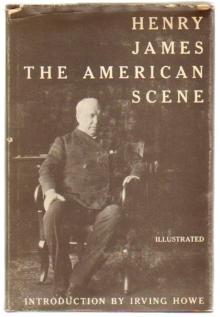 The American
The American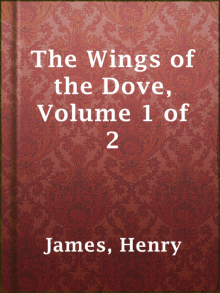 The Wings of the Dove, Volume 1 of 2
The Wings of the Dove, Volume 1 of 2 Frost at Midnight
Frost at Midnight Morning Frost
Morning Frost The Portrait of a Lady — Volume 1
The Portrait of a Lady — Volume 1 Fatal Frost
Fatal Frost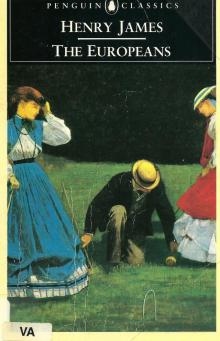 The Europeans
The Europeans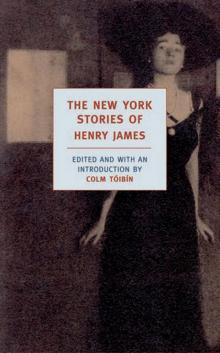 The New York Stories of Henry James
The New York Stories of Henry James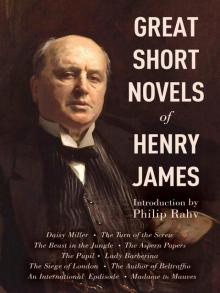 Great Short Novels of Henry James
Great Short Novels of Henry James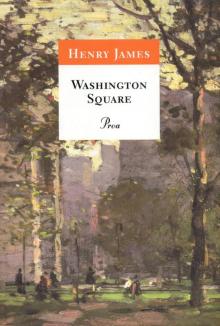 Washington Square
Washington Square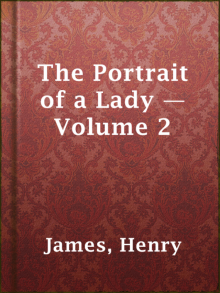 The Portrait of a Lady — Volume 2
The Portrait of a Lady — Volume 2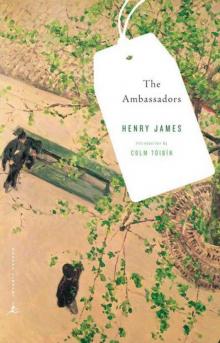 The Ambassadors
The Ambassadors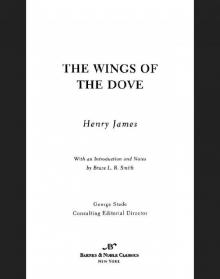 The Wings of the Dove
The Wings of the Dove The Princess Casamassima (Classics)
The Princess Casamassima (Classics) The Coxon Fund
The Coxon Fund First Frost
First Frost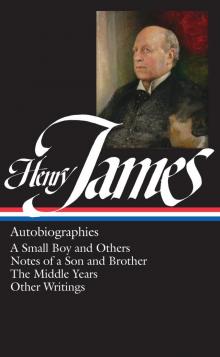 Henry James
Henry James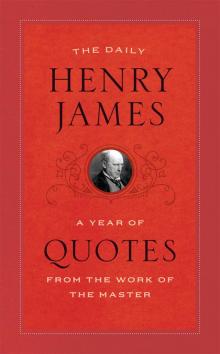 The Daily Henry James
The Daily Henry James Travels With Henry James
Travels With Henry James The Reverberator: A Novel
The Reverberator: A Novel What Maisie Knew (Henry James Collection)
What Maisie Knew (Henry James Collection)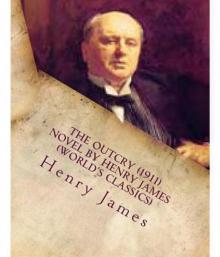 The Outcry
The Outcry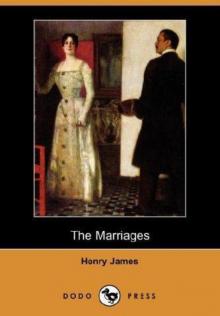 The Marriages
The Marriages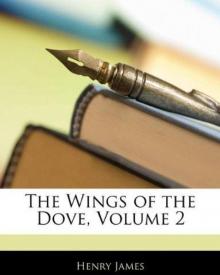 The Wings of the Dove, Volume 2
The Wings of the Dove, Volume 2 The Bostonians, Vol. I
The Bostonians, Vol. I The Outcry: -1911
The Outcry: -1911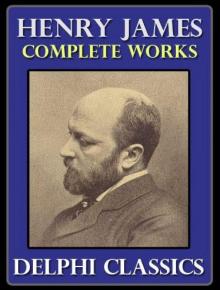 The Complete Works of Henry James
The Complete Works of Henry James Letters from the Palazzo Barbaro
Letters from the Palazzo Barbaro The Pupil
The Pupil The Bostonians, Vol. II
The Bostonians, Vol. II Pandora
Pandora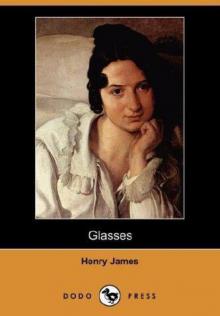 Glasses
Glasses The Princess Casamassima
The Princess Casamassima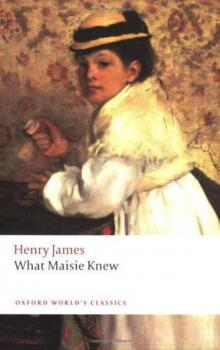 What Maisie Knew
What Maisie Knew The Reverberator
The Reverberator The Golden Bowl - Complete
The Golden Bowl - Complete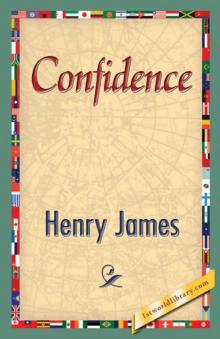 Confidence
Confidence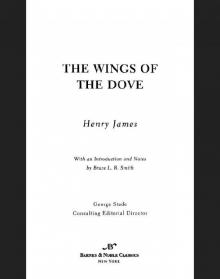 Wings of the Dove (Barnes & Noble Classics Series)
Wings of the Dove (Barnes & Noble Classics Series) The Spoils of Poynton
The Spoils of Poynton